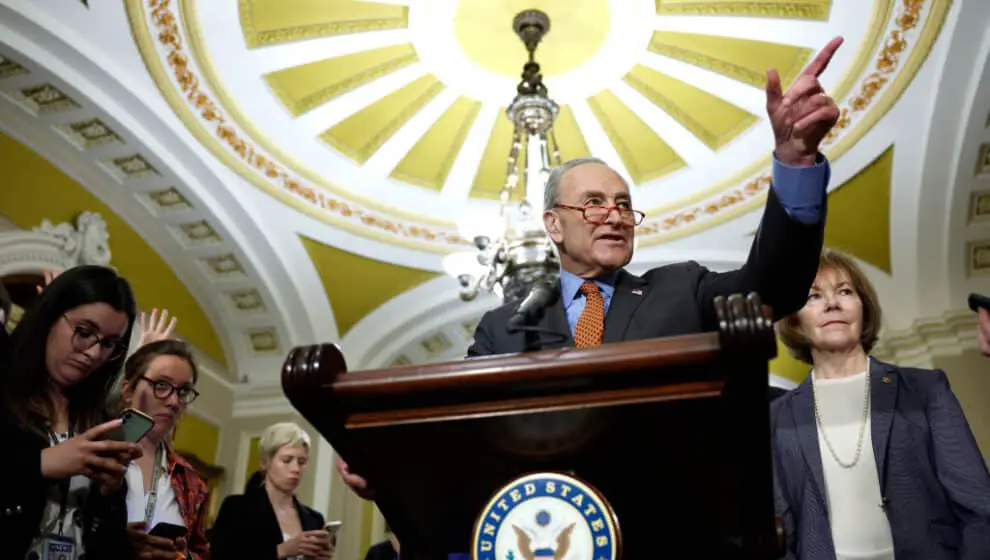The U.S. Senate has announced hearings for committees to analyze the debt-ceiling bill passed by the Republican-led House last week.
Key Details
- Though the White House has stood firm in its refusal to negotiate the debt-ceiling terms with House Speaker Kevin McCarthy (R-CA), the House passed a bill last week to jumpstart negotiations.
- Senate Majority Leader Chuch Schumer (D-NY) announced Monday that Senate committees would evaluate the recently passed bill.
- While McCarthy’s bill attempts to bring President Joe Biden to the table, the bill is unlikely to pass in the Senate.
- “The president says, ‘I’m not going to talk to him until he offers a plan,’” McCarthy says. “Not only did we offer a plan, we passed it.”
Why it’s news
The bill passed in the House last week is unlikely to move forward in Congress at all. Schumer’s decision to send the bill to committee is likely an excuse for Senate Democrats to publicly deride the bill. Most likely, the bill will not get a vote on the Senate floor.
“My understanding, from people I’ve spoken with [in the Senate], is that it’s not even going to get a vote. I think that’s just fine,” Representative Susan Wild (D-PA) says.
If the bill did manage to pass the Senate, President Biden has indicated that he would veto it, Axios reports.
Schumer wrote a “dear colleague” letter on Monday, criticizing the bill and saying that it gives two options: “either default on the debt or default on America, forcing steep cuts to law enforcement, veterans, families, teachers, and kids. Democrats will not allow it.”
The bill has not received unanimous Republican support either. Four House Republicans opposed the bill, including Representatives Andy Biggs (AZ), Ken Buck (CO), Matt Gaetz (FL), and Tim Burchett (TN). Burchett has long opposed a debt ceiling increase on principle, however, the other Republican opponents say that the bill does not go far enough to reduce government spending.
If passed, the bill would lift the debt ceiling through 2024 but restrict discretionary federal government spending to its 2022 levels until 2024. Spending growth would be capped at 1%. The bill calls for other spending cuts, including canceling student loan debt forgiveness, repealing some Inflation Reduction Act tax credits, and reducing IRS funding. It also calls for the federal government to retrieve unspent COVID funds.
The first hearing will be held in the Budget Committee on Thursday.
Backing up a bit
Since last year, Treasury Secretary Janet Yellen has warned lawmakers about the debt ceiling. In January, the U.S. hit the debt ceiling sooner than expected. While the Treasury has been able to implement some “extraordinary measures” to prevent the government from defaulting on its debt, legislators are now under increasing pressure to make a decision. Yellen estimates that Congress has until around June to make a move.
The U.S. government has raised the debt ceiling many times in the nation’s history, sometimes without much debate and other times with much difficulty.
House Republicans are seeking spending cuts as part of a deal to increase the debt ceiling, partly as a way to reduce debt. In response, the White House said it would not negotiate.
In March, McCarthy sent a letter to President Biden, expressing frustration with the administration’s failure to negotiate the debt ceiling at all.
If no agreement is reached, it could trigger a government shutdown. The last government shutdown was in 2019. During a shutdown, non-essential government employees are furloughed while essential workers work without pay. When the shutdown is resolved, workers will receive back pay. Some government services may also be temporarily suspended during a shutdown.

